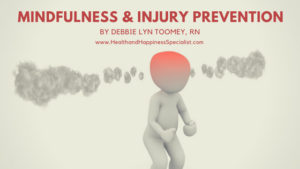Mindfulness and Injury Prevention
By Debbie Lyn Toomey, RN, author of The Happiness Result
What does mindfulness have to do with injury prevention?
Almost everything!
Most accidents are preventable.
For example, have you ever tripped and fallen because your mind was elsewhere and you were not paying attention to what was in front of you?
Or have you ever closed the door on your finger because you were stressed and overwhelmed from what you have to do.
Or have you ever hit another car “by accident” because you were distracted.
As a Mindfulness practitioner and injury prevention professional, I tripped and fell on my hands and knees recently. It happened during a hike. My husband was pointing out another possible hiking trail to me to and before you know it … BOOM! I was on my hands and knees on the dirt and old fallen leaves. Instead of paying attention to where I was going, I looked away. I should have stopped and looked at what my husband was showing me. Doing this would have allowed me to appreciate the other path while maintaining my footing on the hiking trail. In other words, I should have been more mindful. If I was, I wouldn’t have the bruise on my right knee right now.
What is Mindfulness?
Mindfulness is purposely paying attention to whatever it is you are doing, seeing, and feeling -without judgement. Some say that it is being in the present moment or being in the “now.” Mindfulness is a research proven practice that can be taught to both the young and the old.
Why is it important when it comes to injury prevention?
Mindfulness, when applied in the workplace setting, can reduce work-related injuries tremendously. When stress goes up, our ability to concentrate goes down. Stress from many factors such as lack of staffing, lack of team support, lack of time, and lack of self-care time impacts concentration that can increase the risk of mindless actions that can impact the health and safety of the worker and those around them.
Likewise, mindfulness, when taught to high school athletes, can help reduce sports related injuries, such as traumatic brain injury. When mindfulness is practiced as a daily habit, it has a self-regulatory way of helping the person feel more in control, more centered, and calmer. All traits that are important during any games.
What’s a good mindfulness tip for people on the go?
Next time you catch your mind running around like crazy or even jumping around from one thought to another, stop and take 3 slow deep breaths to get back to the present. Reclaiming your sense of presence through breathing is an easy and powerful skill that anyone can develop no matter how old they are.
Need more support?
If you need coaching on how to add more mindfulness into your life, contact me at [email protected]. If you need a great summer book to read, get my book, The Happiness Result. You can get my book on www.TheHappinessResult.com.



